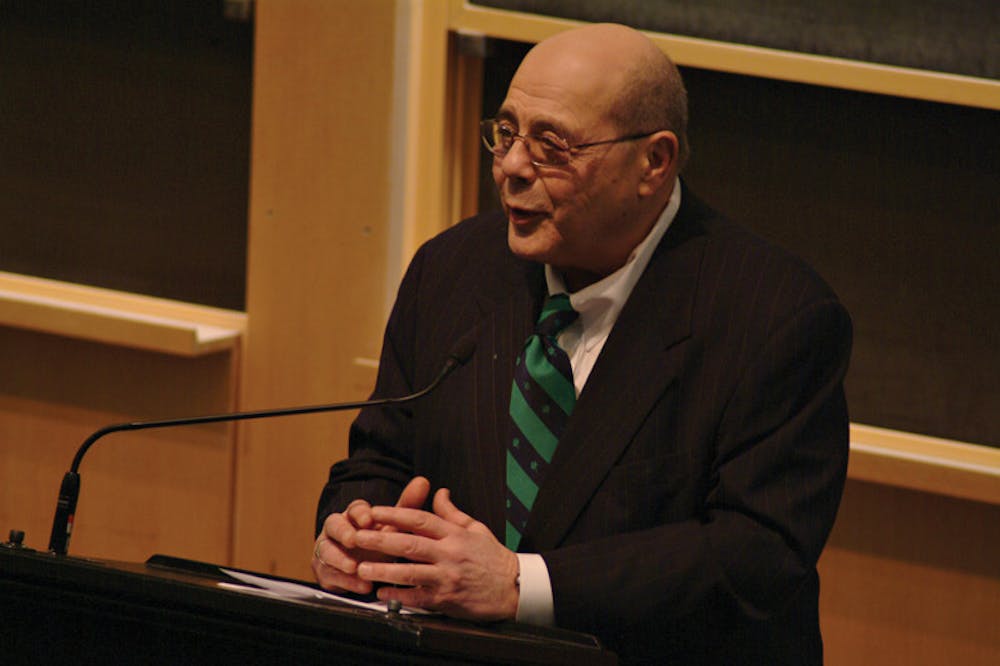A supporter of former Mayor Vincent "Buddy" Cianci filed Cianci’s declaration to run for the office again Wednesday, 17 minutes before the deadline, the Providence Journal reported.
Cianci served as mayor of Providence between 1975 and 1984 and again between 1991 and 2002, during which he was convicted twice — once for assault and once for public corruption. For the latter charge, he served five years in prison, finishing his sentence in 2007.
Cianci has chosen to run as an independent, which gives him “a little bit of a breather” this summer, Scott MacKay, a political analyst for Rhode Island Public Radio, told The Herald. Without the need to worry about a primary election, Cianci has time to hire staff, raise money and focus on his health.
Despite a January cancer diagnosis, the 73-year-old Cianci said his health will not deter his campaign, the Boston Globe reported.
Cianci joins two other candidates running as independents — Lorne Adrain and Jeffrey Edward Lemire. Six Democrats and one Republican have also declared their candidacy to fill the seat of current Mayor Angel Taveras, who is running for governor.
Cianci won the office as a Republican in 1974, but was forced to resign after his first criminal conviction for assault. He was elected again as an independent in 1990 and was known as “Buddy II” until his second criminal conviction in 2002, the Journal reported.
Cianci “was very skillful, winning enough influence and power to get stuff done in Providence,” said James Morone, director of the Taubman Center for Public Policy and American Institutions and professor of political science and urban studies. “Those very skills had dark sides, and that’s what made him this vindictive person that some people really dislike.”
When it comes to Cianci, “you see, quite literally, two people,” Morone said. One Cianci is a man with “incredible entrepreneurial skill to sell Providence,” Morone said, adding that as mayor, Cianci “changed the face of the city, partially through salesmanship.” The other Cianci “is a bare-knuckle, nasty machine politician,” he added.
After Cianci’s candidacy was filed, Democratic candidate Brett Smiley released a statement saying, “Providence cannot afford to return to the corrupt politics of the past, and that is what Buddy Cianci’s candidacy represents.”
“He’s a polarizing figure. Very few people are lukewarm about Buddy Cianci,” MacKay said, adding that this run is the “Buddy Cianci vindication tour.”
“There’s probably 40 percent of the city not voting for him under any circumstances,” he said. But, he added, in a multi-candidate field, the vote will be split up and Cianci could win the election with as little as 34 percent of the vote.
Cianci has performed this trick before, Morone said. During the 1990 election, Cianci won by 317 votes against two opponents, the Journal reported.
Wendy Schiller, associate professor of political science and public policy, noted that when times are bad economically, people get nostalgic and remember the past in a more positive light. “That’s what Buddy is counting on,” she said.
Schiller, MacKay and Morone all said changing demographics pose the greatest challenge to Cianci’s campaign. He must adapt to the current population, which is younger and more professional than when he previously ran, Schiller said.
Providence’s Hispanic population also grew by almost 33 percent between 2000 and 2010, according to U.S. Census Bureau statistics.
Cianci must convince the electorate that he is “a mayor of the 21st-century Providence” with energy and vision to improve current conditions, MacKay said.
Schiller said it is “vitally important” for the Brown community to pay attention to the upcoming election. “The future of the way Brown interacts with Providence … will depend a lot on who the next mayor is,” she added.
And the fact that the pool of candidates includes a 73-year-old two-time convict aiming for a seventh term “makes Providence politics just plain old fun to watch,” Morone said.

ADVERTISEMENT




